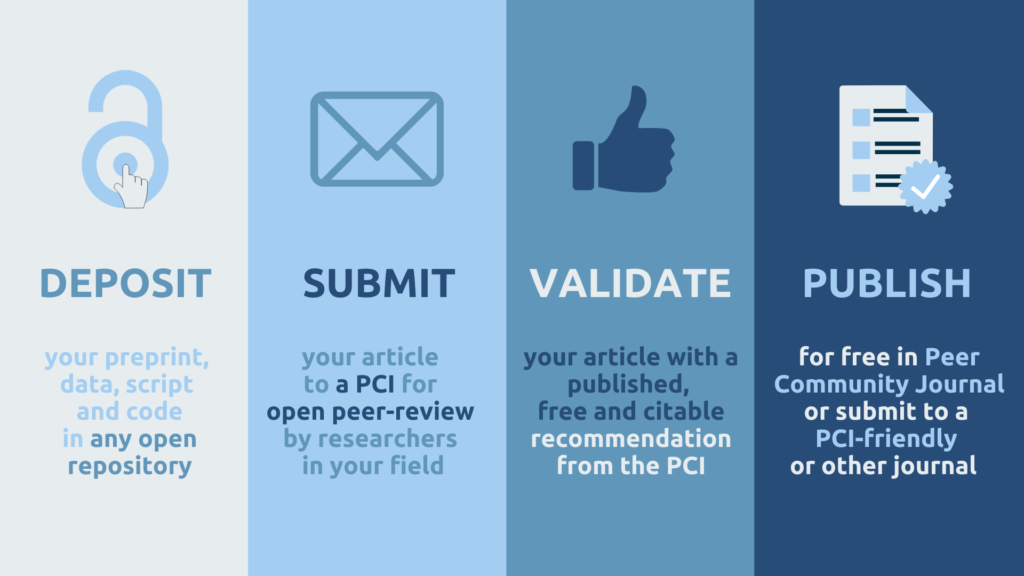Go back
Peer Community in (PCI): two routes to support Plan S
22/02/2022
Peer Community in (PCI) is a public initiative managed by researchers and organized as a set of disciplinary communities providing preprint peer review services that are separate and distinct from publication in a journal. In addition, PCI also publishes a Diamond Open Access journal: the Peer Community Journal. There are currently 14 PCIs, including PCI Ecology, PCI Evol Biol, and PCI Archaeology, and more will be created in the coming months.
PCI offers two routes towards Open Access (OA) publication. One of these routes differs from the three routes defined by Plan S. It does not involve publication in an OA journal or on an OA platform (Route 1), nor publication in a subscription journal with a version of record (VoR) or author accepted manuscript (AAM) in open access in a repository (Route 2), nor publication in a journal in transformative agreement (Route 3).
The new route offered by PCI
The new route offered by PCI – currently missing in Plan S – relies on validation of preprints by peer-review, to give them the same value as articles published in traditional journals. In the PCI system, authors write articles, deposit them as preprints on preprint servers or open repositories with associated data, scripts, and codes, and then submit them to one of the disciplinary PCIs. The submitted articles then go through a reliable and robust peer-review procedure as they would in journals, but with one major difference: if accepted, the editorial process (reviews, editorial decisions, and author responses) are published Open Access. In addition, an editorial recommendation (a clear and argued acceptance decision similar to a “News & view”) explaining the scientific context of the study and the reasons why the article was accepted is also published Open Access.

This open and free publication system – winner of the LIBER innovation award in 2020 – has been chosen by many authors since 2017: 550 submissions and 300 recommendations have been published so far in all PCIs combined. However, the emergence of the PCI model remains difficult because of the established dependence on journals of research institutions and funding agencies, especially in countries where the academic world is subject to the dictatorship of the Impact Factor (IF). Preprint recommendation by Peer Community In does not lead to a VoR, and it neither involves journals nor IF. Hence the difficulty in the prestige market of academic publishing.
Fortunately, within the context of the DORA Declaration and the growing commitment to Open Science, PCI is gaining interest and support from research institutions, in particular in France where the project originated. Many evaluation committees have indicated that they will consider recommended preprints in the same way as they consider articles published in journals. Several established institutes (CNRS, INRAE, Académie des Sciences…) have acknowledged PCI as an important actor in the open science ecosystem.
PCI now also offers Route 1
Based on the lack of explicit recognition and prestige associated with its main route to OA publication, PCI now offers authors the possibility of publishing their PCI-recommended preprint in a Diamond OA journal called Peer Community Journal. Once an article has been recommended by a disciplinary PCI, the authors can opt to publish it in Peer Community Journal virtually without delay and for free. They can also choose to leave their article on preprint servers or in open archives, or submit to other journals (see below). Peer Community Journal is hosted by the web publisher Centre Mersenne, it has recently been indexed by DOAJ, and is a candidate for indexing by the other main journal databases.
The journal’s policy towards IF is described in the association’s statutes: “The journal will not play the game of citation metrics (IF etc.); it will not display citation metrics on its website. Citation metrics will not be discussed during general assemblies of PCI. No communication will be made on citation metrics.”
With PCI, authors retain the copyright of their articles and full control over their outcome
Both Open Access routes offered by PCI allow the authors to retain copyright. Articles published by Peer Community Journal as well as recommendations and reviews published by Peer Community In have a CC BY licence. Preprints recommended by a PCI can have different licenses according to the policy of the open repository where they are deposited by the authors.
After a recommendation, preprints can remain on the preprint server and can be cited as any published article validated by peer-review. Alternatively, authors can submit them to any scientific journal for publication. They can target one of the 90 so-called ‘PCI-friendly’ journals who have committed to take into account the reviews and recommendations published by PCI, or they can transfer it, for free, for publication in Peer Community Journal. PCI thus creates a new ecosystem where:
1) a recommended preprint can be published without further review in a large number of journals,
2) a single peer-review process (of one or several rounds) allows successive submissions to several journals until one of them reaches the wise decision to publish the article. Such a decision is wise because the article has already been fully validated by the scientific community.
The two Open Access routes enabled by PCI respect the Fair Open Access principles (including the key feature of being “free of charge for authors”), which is not the case for the vast majority of journals published in Open Access by commercial publishers.
In this respect, we note that:
- the increasing part of Gold Open Access in publication (Plan S Route 1), creates a considerable risk that the difficulty to access scientific literature because of paywalls is turned into a difficulty to publish scientific literature because of APCs. Only the rich countries will be soon able to publish their studies since this effect is only partly buffered by waivers.
- Transformative Agreements (Plan S Route 3), in which research and funding agencies prepay Open Access fees, will certainly jeopardize Diamond OA journals because these journals will no longer have any financial advantage over Gold Open Access journals for the authors. In addition, these agreements are once again mainly accessible to rich countries, even with waivers, thus depriving authors of less wealthy countries of this third Open Access route.
Conclusion
The two-route strategy adopted by PCI may seem paradoxical. On the one hand, PCI promotes preprints, their evaluation, and their use as a validated piece of science without the need to publish it in a journal. On the other hand, PCI launched its own journal in 2021 as a solution for authors facing evaluation committees and funding agencies that use the IF (and there are still many of them, despite DORA). The evaluation criteria are gradually changing, and it is possible that in the future a recommendation by PCI will be considered a sufficient and clear proof of quality. Authors may then feel freer to stick to a PCI-recommended preprint without the pressure to publish it in a journal.
Whatever the future brings, PCI promotes a science publication system accessible to all readers and authors, associated with evaluation, data, scripts, and codes that are also open to all, at the lowest possible cost for research institutions.
By using the PCI routes, authors not only promote Diamond OA, but also the principle of a fully transparent editorial process. They can use the recommendation of their work for their evaluation, recruitment, or funding applications. These elements should be particularly appreciated by the members of the evaluation committees who are increasingly, and fortunately, turning away from quantitative criteria and opting for qualitative ones.
Thomas Guillemaud
Thomas Guillemaud is a senior scientist at the French National Institute for Research in Agronomy and environment (INRAE). He works in Sophia Antipolis, France, on the evolutionary biology aspects of biological invasions. He co-founded PCI in late 2016 and co-manages PCI since then.
View all posts by
Thomas Guillemaud
Denis Bourguet
Denis Bourguet is a senior scientist at the French National Institute for Research in Agronomy and environment (INRAE). He works in Montpellier, France, in evolutionary biology on pesticide resistance evolution. He co-founded PCI in late 2016 and co-manages PCI since then.
View all posts by
Denis Bourguet
Marjolaine Hamelin
Marjolaine Hamelin is an engineer at the Directorate for Open Science of the French National Research Institute for Agriculture, Food and Environment (INRAE). After 11 years as the managing editor of the journal "Agronomy for Sustainable Development", she joined the PCI team in 2021 as a support officer.
View all posts by
Marjolaine Hamelin





